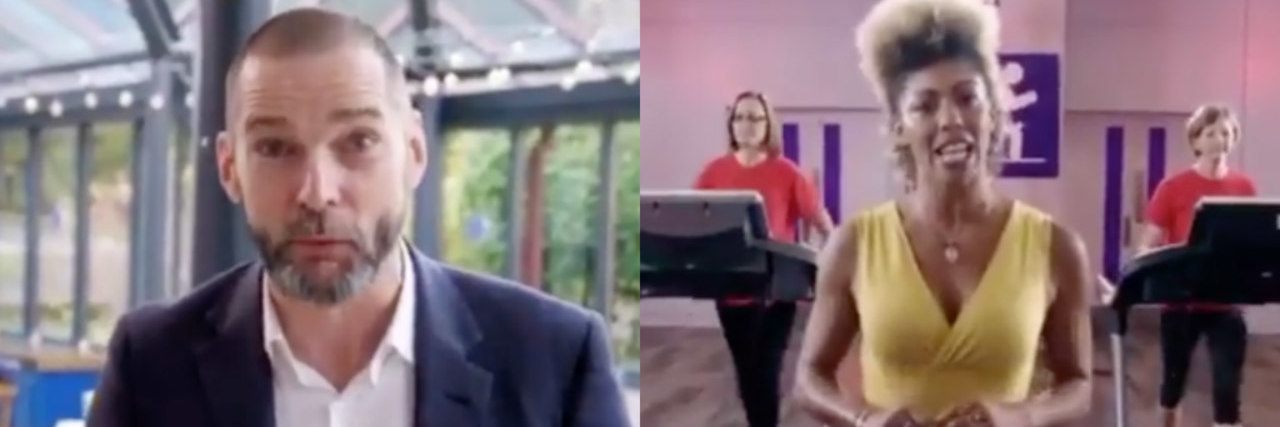BBC's New Show 'The Restaurant That Burns Off Calories' Is Gross and Demoralizing. Here's Why.
Editor's Note
If you live with an eating disorder, the following post could be potentially triggering. You can contact the Crisis Text Line by texting “NEDA” to 741741.
In the wake of COVID-19, people around the world are looking for different ways to entertain themselves, often under limited quarantine conditions. Cue the BBC network’s massive mess-up — yet another problematic and tired show about weight loss and eating. The company that brought to market television gems like “The Office” and “The Great British Bake-Off,” just launched a doozy, “The Restaurant That Burns Off Calories.”
The show, hosted by stars Zoe Williams and Fred Siriex, presents the charming, personable and conventionally attractive duo as experts speaking to eager viewers on the controversial topic of weight loss. Nevermind that we are living through a pandemic where many people are already anxious about their weight and eating habits under quarantine or self-isolation, it’s even more damaging the show’s premise includes unsuspecting diners eating at a restaurant, only to find themselves at an on-site gym where a group of individuals will burn off the calories they’ve just eaten.
The show was admonished by Beat, a UK charity in support of people with eating disorders, on Twitter:
“We strongly discourage anyone with an #eatingdisorder to watch the BBC2 programme The Restaurant that Burns Off Calories airing tonight,” the organization said, then offered extended hours for anyone who needed support after watching or hearing news of the show.
We strongly discourage anyone with an #eatingdisorder to watch the BBC2 programme The Restaurant that Burns Off Calories airing tonight.
We’re keeping our online support group open 3 hours longer & you can contact us by DM on Twitter if you need support https://t.co/DeWTec7kf8
— Beat (@beatED) April 20, 2020
Nevertheless, the show persists, allowing fat positivity deniers to relish in its explanation of science that defines what calories are, why we need them and why people eat more than they burn. The show then presents the conclusion research suggests when people see how much work it takes to burn off their food, they are permanently changed and will revert to eating 20% less in their daily intake, like magic.
They must think that fat folks have never seen the inside of a gym.
This narrative promotes harmful stereotypes about fat people. For one, that we are lazy or don’t work out, that we don’t understand how caloric intake impacts weight and, perhaps most harmful, that if you just “eat less” you will be better — “cured,” if you will.
Some television fans have taken to Twitter to criticize the show, including Ruby Tandoh, runner-up on season four of “The Great British Bake Off.”
in response to the terrible calorie restaurant show, i've written about eating, guilt and the myth that health is a choice ????????????@beatED supported people overtime last night as a result of the show. if you can, please donate via the links in the articlehttps://t.co/yHmGZ9dVbe
— Ruby Tandoh (@rubytandoh) April 21, 2020
The benefit of leaving the BBC is that I can tweet this. For every 99.9% of great, innovative and informative programming the BBC airs across its platforms, there’s 0.01% that shows disgraceful editorial judgement. Exhibit A: https://t.co/udOh8nmBPH
— Sophie Morris (@itssophiemorris) April 20, 2020
can confirm: that programme that sounded awful was indeed awful https://t.co/j0gorg6Rid
— Barbara Speed (@bspeed8) April 20, 2020
As someone who has personally struggled with eating disorders on and off throughout my life, I can’t wrap my brain around why this show exists in 2020. And why now?
It feels like concern trolling, or “the action or practice of disingenuously expressing concern about an issue in order to undermine or derail genuine discussion.” What’s the discussion being undermined and derailed by “The Restaurant that Burns Off Calories”? I’m glad you asked!
It’s the global discussion that health and wellness is not a number on a scale, it’s not something you can earn by restrictive eating and being a gym rat. It’s certainly not encouraging everyday people to cut their caloric intake by 20%. I look forward to a day when junk science about fat people isn’t confused with medicine, but until then, I won’t be tuning in.
If you or someone you know is struggling with an eating disorder, you can call the National Eating Disorders Association Helpline at 1-800-931-2237.
Screenshots via Twitter

